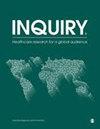人道主义响应中关怀的 "新 "维度:公共卫生姑息关怀促进人道主义与发展关系、非殖民主义和本土化思想的机遇
IF 1.7
4区 医学
Q3 HEALTH CARE SCIENCES & SERVICES
Inquiry-The Journal of Health Care Organization Provision and Financing
Pub Date : 2024-09-14
DOI:10.1177/00469580241277443
引用次数: 0
摘要
姑息关怀的框架如何推动人道主义话语?在人道主义环境中开展姑息关怀的必要性日益迫切。卫生和人道主义组织最近所做的努力表明,人们越来越关注这一问题。然而,在人道主义机构的言论、政策、研究或实践中,姑息关怀仍未得到充分的正式考虑或实施。即使在人道主义行动中考虑到了姑息关怀,姑息关怀也往往被认为是一种新的干预措施,而不是一种自古以来就存在的关怀实践,包括在人道主义局势中。本文观点的产生经历了一个动态的、反复的和反思的过程,其间作者们参阅了主要文献、进行了批判性思考、与这两个部门的同事进行了交谈、收集了原始数据并展开了辩论。本文认为,目前在人道主义领域中新的、专业化、职业化和医疗化姑息关怀的主导框架将使现有的挑战永久化。论文认为,从 "新-旧 "的视角来看待这两个领域,将历史和传统的关怀实践与进步的话语交织在一起,以采取更加公正和适当的公共卫生应对措施,可以促进人道主义事业的发展。报告认为,通过与广泛的文献进行批判性互动,人道主义与发展的关系、非殖民主义和本土化思想可以从姑息关怀实践中受益。本文章由计算机程序翻译,如有差异,请以英文原文为准。
The “New-Old” Dimensions of Caring in Humanitarian Response: The Opportunity for Public Health Palliative Care to Advance the Humanitarian-Development Nexus, Decoloniality, and Localization Thought
How can palliative care framings advance humanitarian discourse? The imperative for palliative care in humanitarian settings is increasingly urgent. Recent efforts by health and humanitarian organizations demonstrate increasing attention to the issue. Yet palliative care is still not adequately formally considered or enacted by humanitarian agencies in rhetoric, policy, research, or practice. Even where it is considered in humanitarian action, palliative care is often assumed to be a novel intervention, rather than a caring practice that has existed from time immemorial, including in humanitarian situations. The generation of ideas in this paper has followed a dynamic, iterative, and reflexive process through engagement with key literature, critical thinking, conversations with colleagues across both sectors, primary data, and debate amongst the authors. The paper argues that the current dominant frame of a new, specialized, professionalized, and medicalized palliative care in the humanitarian sector would perpetuate existing challenges. It contends that viewing both fields through a “new-old” lens, where historical and traditional caring practices intertwine with progressive discourse for a more just and appropriate public health response, can further humanitarianism. It posits that the humanitarian-development nexus, decoloniality, and localization thought can benefit from palliative care practice through critical interaction with a broad range of literature.
求助全文
通过发布文献求助,成功后即可免费获取论文全文。
去求助
来源期刊
CiteScore
2.50
自引率
0.00%
发文量
192
审稿时长
>12 weeks
期刊介绍:
INQUIRY is a peer-reviewed open access journal whose msision is to to improve health by sharing research spanning health care, including public health, health services, and health policy.

 求助内容:
求助内容: 应助结果提醒方式:
应助结果提醒方式:


